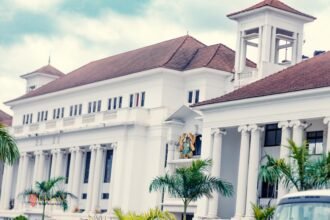
On 10th May 2024 Hopson Adorye, a political player and former staunch member of the New Patriotic Party (NPP) now the Director of Special Duties for the Alliance for Revolutionary Change revealed that, he together with others, during the 2016 election, detonated dynamites in some parts of the Volta Region to purposely scare voters away voting thereby facilitating the NPP’s victory in that year’s election.
Following his statement, Hopson Adorye was arrested by the Ghana Police on 22nd May, 2024 and charged with publication of false news and held in custody at the Ministries police station. On 23rd May, 2024 he was arraigned before the Dansoman Circuit Court, where he was granted bail to the sum of GHC 20,000 with two sureties and he is to report to the police station every Monday to assist in further investigations.
The Central legal question that arises are follows:
Under the Criminal Code (Act 29), section 208 (1) provides that a person who publishes or reproduces any statement, rumour or report which is likely to cause fear and alarm to the public or to disturb the public peace knowing or having reason to believe that the statement, rumour or report is false is guilty of a misdemeanour.
Further, under section 208 (2), a defence under subsection (1) states that the person charged is not liable if he did not know or did not have reason to believe that the statement, rumour or report was false unless he proves that, prior to publication, he took reasonable measures to verify the accuracy of the statement, rumour or report.
It is instructive to add that, section 75 of the Electronic Communications Act, 2009, Act 775, provides for a similar offence relating to publication of false communication. To be fair, the law as captured under Act 775 is more refined and clearly defined than under Act 29, albeit with a much severe and harsher punishment upon conviction. Both provisions relate to publication of false news with intent to cause fear and alarm.
The above laws on publication of false news in Ghana, although enacted to safeguard the security of the state has however faced some reasonable backlash from some section of the citizenry, media practitioners and civil society organizations. They have asked for those provisions to be repealed or amended. They contend that the laws in their current applications have been abused by the police and agents of the State and appointees of government to harass, detain and prosecute journalists and perceived political opponents, and thereby eroding and muzzling free speech.
Hopson Adorye returns to court on 26th June, 2024, and it remains to be seen what lies ahead for him.
Are there possible defences to the offense of false publication:
A possible defence to the charge above may be simplified as follows; if the accused could prove by some reasonable evidence that his claims are true and happened as he said, or that he had no reason to believe that the statement was false or reckless; or he verified from sources before making the statement.
What is the likely punishment?
According to Act 29 a person found liable of the offence stated above commits a misdemeanor and is liable to a fine or three (3) years imprisonment or both. Similarly, if convicted under the Act 775, he faces a fine of not more than three thousand penalty units (an equivalent of GHC 36,000) or to a term of imprisonment of not more than five (5) years or both.
Naiza Issifu a Third-year student at MountCrest University Faculty of Law contributed to research.











